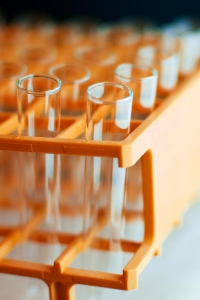Anthrax is an often-fatal disease caused by the bacteria Bacillus anthracis that can spread from grazing animals to humans. It is now rare in developed countries but there are periodic outbreaks in poorer nations, and concerns about its use in bioterrorism have renewed global attempts to develop a vaccine. Anthrax toxin is responsible for much of the harm caused by the disease.
"The anthrax toxin is made up of multiple proteins and only becomes active – and starts doing damage – when those proteins cluster together in a very specific way," explains Associate Professor Alok Mitra who led the research.
"We have found that the neutralising antibody destroys the configuration of the toxin cluster, adding more proteins to the mix and altering their arrangement so that they can no longer act as they normally would.
"It has been known for some time that this antibody is very effective at neutralising anthrax toxin in the laboratory, but it is not a simple case of turning the antibody into an immunisation device for humans. We need to know how the antibody works in order to develop an effective vaccine and our research is an important step in this direction."
The work also has much broader implications, demonstrating that a simple new method (using transmission electron microscopy) can be used to identify other antibodies with neutralising potential.
"Our research was the first to show that an antibody can structurally alter its target in this way, but it is unlikely to be the only example in nature and may in fact prove to be an important biological process," explains Dr Mitra.
"We have shown that by mixing antibodies and their targets in the laboratory and looking under a high-powered microscope for the kinds of abnormal clusters we have seen, scientists can quickly and easily search for neutralising antibodies for many diseases."
Researchers around the world are continuing in the attempt to create a traditional anthrax vaccine using the neutralising antibody and related antibodies.
Dr Mitra says that the next steps for his team will be to study in greater detail how the abnormal complexes are formed and exactly where the antibody binds to the toxin. This may allow the development of small synthetic proteins to mimic the antibody's activity that could be given prior to exposure to the toxin, as an alternative method of vaccination.
The current research, published in the Proceedings of the National Academy of Sciences was undertaken by scientists in the School of Biological Sciences at The University of Auckland, using a neutralising antibody provided by collaborators at the National Institutes of Health in the United States.

